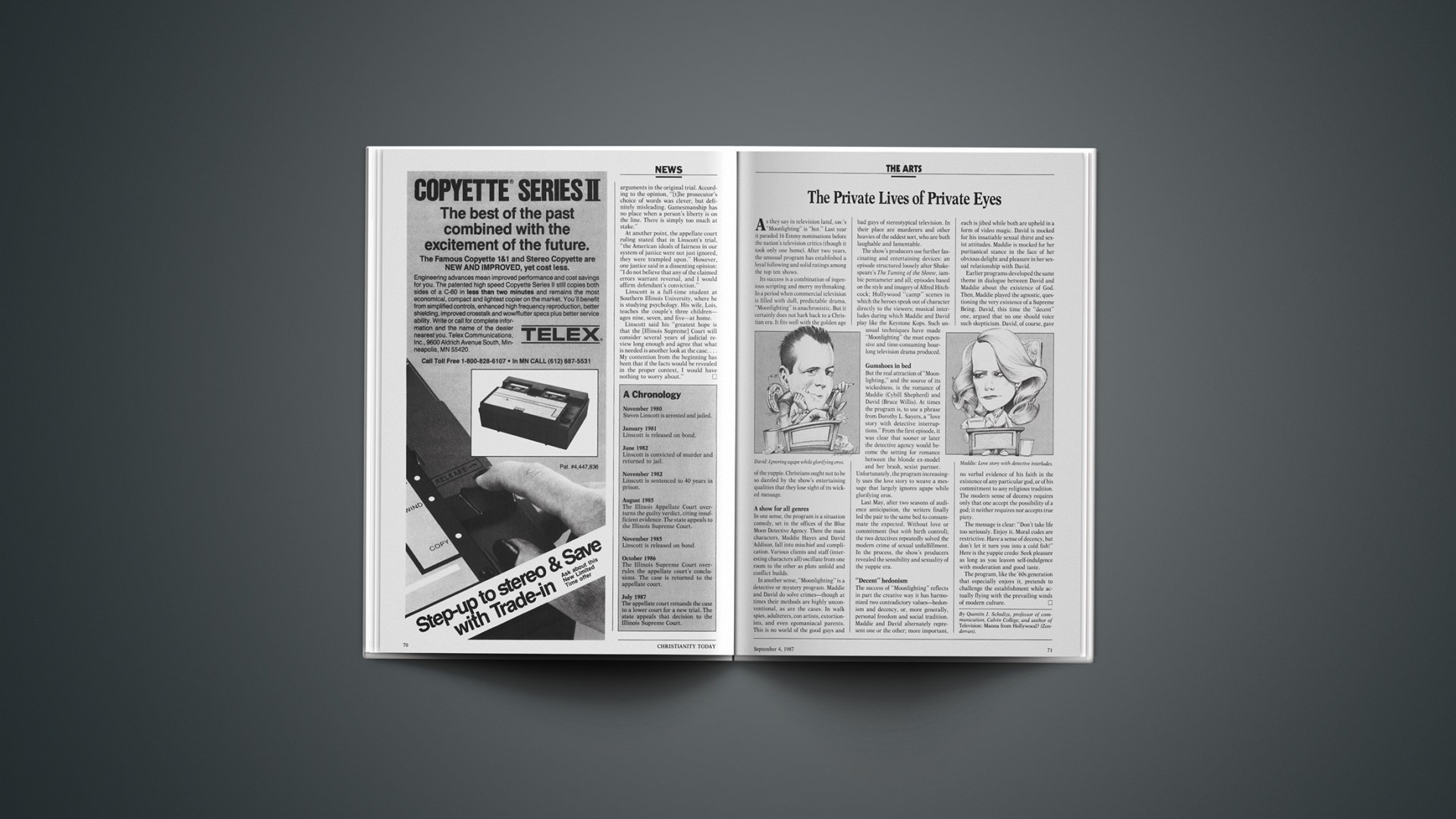As they say in television land, ABC’S “Moonlighting” is “hot.” Last year it paraded 16 Emmy nominations before the nation’s television critics (though it took only one home). After two years, the unusual program has established a loyal following and solid ratings among the top ten shows.
Its success is a combination of ingenious scripting and merry mythmaking. In a period when commercial television is filled with dull, predictable drama, “Moonlighting” is anachronistic. But it certainly does not hark back to a Christian era. It fits well with the golden age of the yuppie. Christians ought not to be so dazzled by the show’s entertaining qualities that they lose sight of its wicked message.
A Show For All Genres
In one sense, the program is a situation comedy, set in the offices of the Blue Moon Detective Agency. There the main characters, Maddie Hayes and David Addison, fall into mischief and complication. Various clients and staff (interesting characters all) oscillate from one room to the other as plots unfold and conflict builds.
In another sense, “Moonlighting” is a detective or mystery program. Maddie and David do solve crimes—though at times their methods are highly unconventional, as are the cases. In walk spies, adulterers, con artists, extortionists, and even egomaniacal parents. This is no world of the good guys and bad guys of stereotypical television. In their place are murderers and other heavies of the oddest sort, who are both laughable and lamentable.
The show’s producers use further fascinating and entertaining devices: an episode structured loosely after Shakespeare’s The Taming of the Shrew, iambic pentameter and all; episodes based on the style and imagery of Alfred Hitchcock; Hollywood “camp” scenes in which the heroes speak out of character directly to the viewers; musical interludes during which Maddie and David play like the Keystone Kops. Such unusual techniques have made “Moonlighting” the most expensive and time-consuming hour-long television drama produced.
Gumshoes In Bed
But the real attraction of “Moonlighting,” and the source of its wickedness, is the romance of Maddie (Cybill Shepherd) and David (Bruce Willis). At times the program is, to use a phrase from Dorothy L. Sayers, a “love story with detective interruptions.” From the first episode, it was clear that sooner or later the detective agency would become the setting for romance between the blonde ex-model and her brash, sexist partner. Unfortunately, the program increasingly uses the love story to weave a message that largely ignores agape while glorifying eros.
Last May, after two seasons of audience anticipation, the writers finally led the pair to the same bed to consummate the expected. Without love or commitment (but with birth control), the two detectives repeatedly solved the modern crime of sexual unfulfillment. In the process, the show’s producers revealed the sensibility and sexuality of the yuppie era.
“Decent” Hedonism
The success of “Moonlighting” reflects in part the creative way it has harmonized two contradictory values—hedonism and decency, or, more generally, personal freedom and social tradition. Maddie and David alternately represent one or the other; more important, each is jibed while both are upheld in a form of video magic. David is mocked for his insatiable sexual thirst and sexist attitudes. Maddie is mocked for her puritanical stance in the face of her obvious delight and pleasure in her sexual relationship with David.
Earlier programs developed the same theme in dialogue between David and Maddie about the existence of God. Then, Maddie played the agnostic, questioning the very existence of a Supreme Being. David, this time the “decent” one, argued that no one should voice such skepticism. David, of course, gave no verbal evidence of his faith in the existence of any particular god, or of his commitment to any religious tradition. The modern sense of decency requires only that one accept the possibility of a god; it neither requires nor accepts true piety.
The message is clear: “Don’t take life too seriously. Enjoy it. Moral codes are restrictive. Have a sense of decency, but don’t let it turn you into a cold fish!” Here is the yuppie credo: Seek pleasure as long as you leaven self-indulgence with moderation and good taste.
The program, like the ’60s generation that especially enjoys it, pretends to challenge the establishment while actually flying with the prevailing winds of modern culture.
By Quentin J. Schultze, professor of communication, Calvin College, and author of Television: Manna from Hollywood? (Zondervan).










